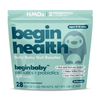Poop Frequency During Solids: How Often Should Babies Go?
share this article
 One of the most common questions parents have when starting solids is, how often should my baby be pooping? The truth is that poop frequency changes a lot once solids are introduced and what is normal can vary from baby to baby.
One of the most common questions parents have when starting solids is, how often should my baby be pooping? The truth is that poop frequency changes a lot once solids are introduced and what is normal can vary from baby to baby.
Here is what parents need to know about poop frequency during solids, what is normal, what is not, and how to support healthy digestion.
How Poop Changes When Starting Solids
-
Poop becomes thicker, smellier, and more formed compared to the runny, mustard-like stools from breastmilk or formula.
-
Poop frequency often slows down as the gut adapts to digesting solids.
-
Color and texture vary more depending on what foods are introduced.
What Is Normal Poop Frequency for Babies on Solids?
-
Anywhere from 1 to 3 times per day to once every 1-3 days is considered normal for babies eating solids.
-
Some babies continue to poop daily, while others shift to every other day or every few days.
-
What matters more than frequency is the comfort, consistency, and ease of passing stool.
Signs Poop Frequency Is a Problem
-
Going more than 3 days without pooping with signs of discomfort
-
Hard, dry, pellet-like stools
-
Straining, crying, or obvious pain during pooping
-
Belly bloating or refusal to eat
-
Stools so large they cause small tears or bleeding
If any of these occur, it is a sign of constipation, not just normal poop spacing.
What Affects Poop Frequency During Solids
-
Type of foods introduced: Low-fiber foods like rice cereal, bananas, and white bread can slow digestion, while fiber-rich foods help keep it regular.
-
Hydration: As solids increase, babies need more fluids to support digestion.
-
Gut microbiome: A healthy, balanced gut microbiome helps regulate digestion and pooping frequency.
-
Movement: Babies who are more physically active (crawling, rolling, scooting) often poop more regularly.
How to Support Healthy Poop Frequency
-
Offer fiber-rich first foods: Pears, prunes, peas, beans, oats, and avocado are helpful.
-
Hydrate: Continue breastmilk or formula as the main nutrition, plus small amounts of water with meals starting at 6 months.
-
Feed the gut: A daily prebiotic like Beginbaby Prebiotic + Probiotics can help support beneficial gut bacteria that regulate pooping patterns.
-
Include healthy fats: Avocado, olive oil, and full-fat yogurt help keep stools soft.
-
Encourage movement: Tummy time, crawling, and gentle exercises like leg bicycles support motility.
When to Call the Pediatrician
Check in if:
-
Baby has not pooped for 5 or more days
-
There is blood in the stool
-
Stools are consistently hard or painful
-
Pooping causes distress, refusal to eat, or belly bloating
Summary
Poop frequency during solids can range from daily to every few days and still be normal—as long as stools are soft, easy to pass, and your baby is comfortable. Focus on fiber, hydration, gut-friendly prebiotics, and movement to help support healthy digestion as your baby grows.


















